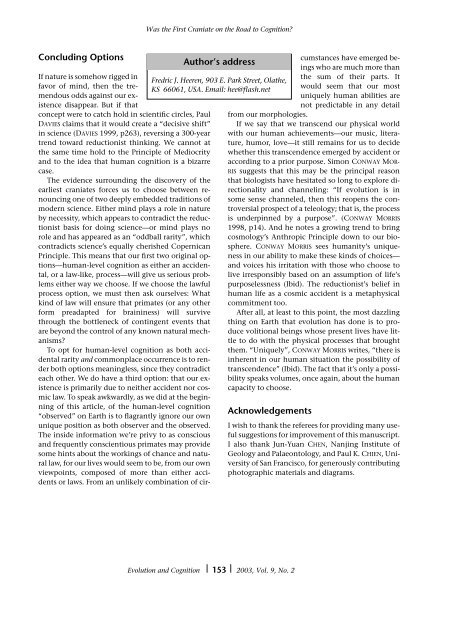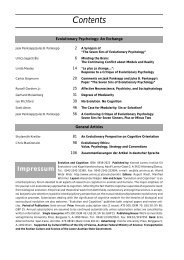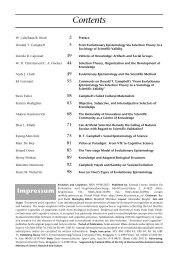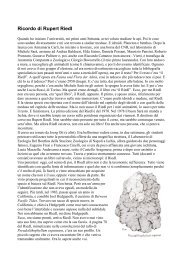Contents - Konrad Lorenz Institute
Contents - Konrad Lorenz Institute
Contents - Konrad Lorenz Institute
You also want an ePaper? Increase the reach of your titles
YUMPU automatically turns print PDFs into web optimized ePapers that Google loves.
Was the First Craniate on the Road to Cognition<br />
Concluding Options<br />
Author’s address<br />
Fredric J. Heeren, 903 E. Park Street, Olathe,<br />
KS 66061, USA. Email: hee@flash.net<br />
If nature is somehow rigged in<br />
favor of mind, then the tremendous<br />
odds against our existence<br />
disappear. But if that<br />
concept were to catch hold in scientific circles, Paul<br />
DAVIES claims that it would create a “decisive shift”<br />
in science (DAVIES 1999, p263), reversing a 300-year<br />
trend toward reductionist thinking. We cannot at<br />
the same time hold to the Principle of Mediocrity<br />
and to the idea that human cognition is a bizarre<br />
case.<br />
The evidence surrounding the discovery of the<br />
earliest craniates forces us to choose between renouncing<br />
one of two deeply embedded traditions of<br />
modern science. Either mind plays a role in nature<br />
by necessity, which appears to contradict the reductionist<br />
basis for doing science—or mind plays no<br />
role and has appeared as an “oddball rarity”, which<br />
contradicts science’s equally cherished Copernican<br />
Principle. This means that our first two original options—human-level<br />
cognition as either an accidental,<br />
or a law-like, process—will give us serious problems<br />
either way we choose. If we choose the lawful<br />
process option, we must then ask ourselves: What<br />
kind of law will ensure that primates (or any other<br />
form preadapted for braininess) will survive<br />
through the bottleneck of contingent events that<br />
are beyond the control of any known natural mechanisms<br />
To opt for human-level cognition as both accidental<br />
rarity and commonplace occurrence is to render<br />
both options meaningless, since they contradict<br />
each other. We do have a third option: that our existence<br />
is primarily due to neither accident nor cosmic<br />
law. To speak awkwardly, as we did at the beginning<br />
of this article, of the human-level cognition<br />
“observed” on Earth is to flagrantly ignore our own<br />
unique position as both observer and the observed.<br />
The inside information we’re privy to as conscious<br />
and frequently conscientious primates may provide<br />
some hints about the workings of chance and natural<br />
law, for our lives would seem to be, from our own<br />
viewpoints, composed of more than either accidents<br />
or laws. From an unlikely combination of circumstances<br />
have emerged beings<br />
who are much more than<br />
the sum of their parts. It<br />
would seem that our most<br />
uniquely human abilities are<br />
not predictable in any detail<br />
from our morphologies.<br />
If we say that we transcend our physical world<br />
with our human achievements—our music, literature,<br />
humor, love—it still remains for us to decide<br />
whether this transcendence emerged by accident or<br />
according to a prior purpose. Simon CONWAY MOR-<br />
RIS suggests that this may be the principal reason<br />
that biologists have hesitated so long to explore directionality<br />
and channeling: “If evolution is in<br />
some sense channeled, then this reopens the controversial<br />
prospect of a teleology; that is, the process<br />
is underpinned by a purpose”. (CONWAY MORRIS<br />
1998, p14). And he notes a growing trend to bring<br />
cosmology’s Anthropic Principle down to our biosphere.<br />
CONWAY MORRIS sees humanity’s uniqueness<br />
in our ability to make these kinds of choices—<br />
and voices his irritation with those who choose to<br />
live irresponsibly based on an assumption of life’s<br />
purposelessness (Ibid). The reductionist’s belief in<br />
human life as a cosmic accident is a metaphysical<br />
commitment too.<br />
After all, at least to this point, the most dazzling<br />
thing on Earth that evolution has done is to produce<br />
volitional beings whose present lives have little<br />
to do with the physical processes that brought<br />
them. “Uniquely”, CONWAY MORRIS writes, “there is<br />
inherent in our human situation the possibility of<br />
transcendence” (Ibid). The fact that it’s only a possibility<br />
speaks volumes, once again, about the human<br />
capacity to choose.<br />
Acknowledgements<br />
I wish to thank the referees for providing many useful<br />
suggestions for improvement of this manuscript.<br />
I also thank Jun-Yuan CHEN, Nanjing <strong>Institute</strong> of<br />
Geology and Palaeontology, and Paul K. CHIEN, University<br />
of San Francisco, for generously contributing<br />
photographic materials and diagrams.<br />
Evolution and Cognition ❘ 153 ❘ 2003, Vol. 9, No. 2








